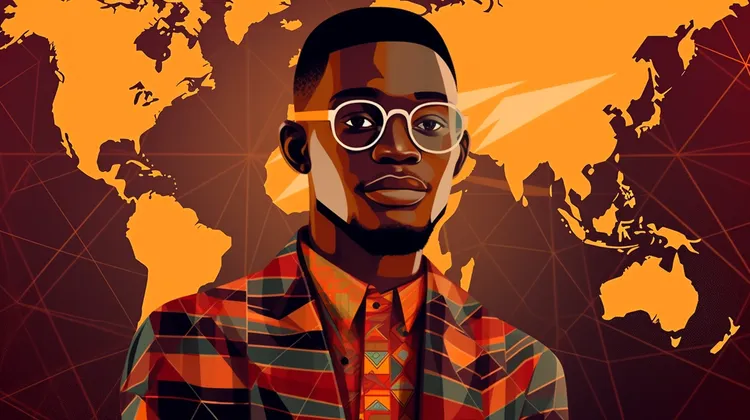
Blockchain: African Upskilling Made Easy
Blockchain technology is revolutionizing industries across the globe, and Africa is no exception. With its potential to enhance transparency, security, and trust, blockchain is making it easier for Africans to upskill and gain access to better job opportunities. In this article, we will explore how blockchain technology is empowering the African workforce.
One of the main challenges faced by many Africans in upskilling is the lack of credible and verifiable certifications. Traditional certification systems are often plagued by fraud and inconsistencies, making it difficult for employers to trust the skills claimed by job applicants. Blockchain technology can address this issue by providing a decentralized and transparent platform for issuing and verifying credentials.
By storing certifications on a blockchain, individuals can have a secure and tamper-proof record of their skills and qualifications. This makes it easier for employers to validate the authenticity of certifications, eliminating the need for time-consuming and costly verification processes. Africans can now confidently showcase their skills and expertise, increasing their employability in a competitive job market.
Moreover, blockchain technology can improve the accessibility and affordability of upskilling programs. Many Africans face financial constraints when it comes to enrolling in formal education or training courses. Blockchain-based platforms can enable decentralized learning environments, seamlessly connecting learners with educators and reducing the cost of intermediaries.
These platforms can also leverage smart contracts to ensure fair compensation for educators. By automatically executing payments upon completion of milestones or certification of skills, blockchain eliminates the need for trust in often unreliable centralized payment systems. This allows Africans to access high-quality upskilling programs and incentivizes educators to offer their expertise in remote areas.
Another key benefit of blockchain technology in upskilling is the potential for lifelong learning. With the traditional education system, many Africans face barriers to continuing education due to factors such as location, time constraints, or financial limitations. However, blockchain-powered platforms can enable individuals to earn micro-credentials or badges for completing small, specialized courses or projects.
These badges can be stored on a blockchain and accumulate over time, creating a comprehensive and verifiable record of an individual’s continuous learning journey. Employers can then easily assess an applicant’s commitment to lifelong learning, enhancing their chances of landing better job opportunities and career growth.
Furthermore, blockchain technology has the potential to connect Africans with job opportunities globally. Currently, many Africans are limited to local job markets due to challenges in verifying their qualifications internationally. However, by leveraging blockchain-based credentials, Africans can overcome this barrier and gain access to global job opportunities.
In addition to job mobility, blockchain technology can foster entrepreneurship and economic empowerment in Africa. By enabling peer-to-peer transactions and smart contracts, blockchain reduces the reliance on intermediaries and facilitates secure cross-border trade. Startups and small businesses can leverage this technology to expand their reach, access funding through decentralized crowdfunding platforms, and establish trust with customers and partners.
However, it is crucial to address the digital divide and ensure equal access to blockchain technology. While blockchain has the potential to uplift Africans in upskilling, it is essential to bridge the gap in internet connectivity and digital literacy. Governments and organizations should invest in infrastructure and educational programs to empower Africans to take full advantage of the benefits that blockchain technology offers.
In conclusion, blockchain technology is providing opportunities for Africans to upskill and overcome various challenges in the job market. By offering a trusted and decentralized platform for verification, enhancing accessibility and affordability of upskilling programs, enabling lifelong learning, and connecting Africans with global job opportunities, blockchain is revolutionizing the African workforce. It is crucial for stakeholders to ensure equal access to this technology and empower all Africans to leverage its potential for personal and economic growth.
9 thoughts on “Blockchain: African Upskilling Made Easy”
Leave a Reply
You must be logged in to post a comment.
Blockchain is just a buzzword that won’t actually benefit Africans in any meaningful way.
This article completely overlooks the fact that not all Africans have access to the internet or digital devices.
I don’t think blockchain will truly revolutionize the African workforce. It’s just not realistic.
The impact of blockchain on entrepreneurship and economic empowerment in Africa is incredible. Peer-to-peer transactions and secure cross-border trade facilitated by blockchain can help startups and small businesses expand their reach and establish trust with partners and customers.
Blockchain is just another buzzword that will fizzle out soon. Africans shouldn’t get their hopes up.
This article seems like it’s painting an unrealistic picture of what blockchain can do for Africa. 🙄
Blockchain might be too complicated for many Africans to understand and utilize effectively.
Who’s going to pay for Africans to access these expensive blockchain platforms? It’s not practical. 💸😒
I have a hard time believing that blockchain will have any real impact on African job opportunities.